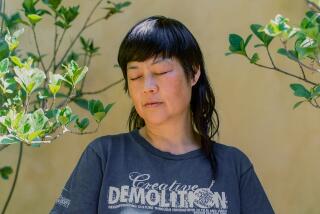Tan turns her suffering into empathy for others
NEW YORK — Her skin is flawless. It appears particularly luminous on this dark, rainy morning. She is wearing a mandarin-collared shirt adorned with small metallic Buddhas, a gift from a well-known Hong Kong designer. With her silver bracelets and pendant earrings, Amy Tan looks like she’s about to step out for a typical New York evening.
But the bestselling author of “The Joy Luck Club,” her first collection of interwoven stories, is seated at the kitchen table in her Manhattan loft, sipping a cup of freshly brewed coffee and talking about her latest novel, “Saving Fish From Drowning.”
The book is part comical, part supernatural and part political, and it concerns a group of American tourists in Myanmar, also known as Burma. The tale recounts how they handle their abduction by an ethnic minority that believes one of the Americans has the power to liberate them from the long-reigning military junta’s torture, forced labor, relocation and other abuse.
Because Myanmar is one of the worst violators of human rights in the world, Tan was hesitant to travel there to research the book. In the end, though, she decided to go. Like her characters, she went on a guided art tour with friends, starting out in China and continuing on the Burma Road.
But one of the main questions she set out to explore in the novel is: How do we best deal with the suffering of others?
“I realize that at this point in my life, the things that I think about a lot have to do with discomfort, discomfort about what I feel about the suffering of other people, of what I’m supposed to be doing, what I can do, what I can’t do, what I don’t want to do,” she says.
Tan’s descriptions of the suffering of the Karen National Union, an ethnic insurgent group in Myanmar, are some of the most deeply felt in the novel. Her wealthy American characters get to see firsthand the gross mutilations -- missing limbs and scarred faces -- of people who were forced to test land mines to see if they were still effective. How the Americans respond to the Karen suffering is painfully realistic.
The author’s own suffering, from a case of Lyme disease she got in 1999, has helped her empathize with the suffering of others. But hasn’t her own painful past -- the deaths of her father and her older brother, managing her mother’s depression and the murder of a close friend -- already given her enough understanding of suffering?
“I think that until you physically suffer and feel helpless and hopeless and wonder who is going to help you and how.... I think that was the turning point,” she says of how physical agony can be even worse than the loss of loved ones.
As a result of the Lyme disease, Tan has memory loss, seizures and hallucinations and at times hasn’t been able to walk. The pain in her feet was so terrible that the 53-year-old often could not leave her house. Now she takes anti-seizure medication and antibiotics and gives herself an inter-muscular shot once a week, and now she feels “great.”
“Now that I’ve been treated,” she later elaborated by e-mail, “I am doing 120 percent -- writing and doing things with great energy, taking advantage of the resources of my brain, and writing with a strong look at what is important.”
Tan grew up in the San Francisco Bay area with two brothers, the children of an engineer-Baptist minister father and a mother who often threatened to kill herself. Tan’s mother, as a child, had witnessed her own mother’s suicide, and when she emigrated from China, in 1949, she had to leave her three daughters behind.
At age 35, Tan sold her book proposal for “The Joy Luck Club” one month after her first trip to China with her mother. The book was published in 1989 to critical acclaim and became an international bestseller. “The Joy Luck Club” has sales approaching 5 million and has been sold in more than 25 countries, according to Tan’s agent, Sandra Dijkstra. It is now an American classic and is taught in high schools and colleges. Tan also co-wrote the screenplay for the Wayne Wang film.
Tan has continued to explore mother-daughter relationships, the American immigrant experience and Chinese history and myth in other bestsellers, including “The Kitchen God’s Wife,” “The Hundred Secret Senses” and “The Bonesetter’s Daughter.”
Questions about her role in the world and what she should be doing in it probably come from her father, who died of a brain tumor when Tan was a teenager.
“I haven’t written about him because I idealized him. In my mind, he was a morally almost perfect person, even though his thoughts about [morality] were kind of impossible,” she says.
Tan worked on “Saving Fish” for five years with Molly Giles, a writer, teacher and friend who has helped edit most of Tan’s novels.
Giles calls Tan “fragile.”
“She received a lot of publicity early. It makes a writer slightly paranoid. It happens to a lot of writers in the limelight,” Giles says.
Tan does seem guarded, but she is battling a three-day cold. Lou DeMattei, an investment advisor and Tan’s husband of 31 years, unobtrusively sets a box of tissues in front of her during a recent interview. But he is scarce during most of the visit, emerging to quiet their Yorkshire terrier, Bubba, who begins barking when a photographer arrives.
Tan and her husband -- the couple have no children -- have a home in San Francisco but stay in New York when Tan needs to do lectures or charity events.
Their home seems well outfitted for overnight guests and entertaining. There is a “guest tent” -- multicolored fabric enclosing a double bed near the entrance -- a newly designed kitchen and a Steinway grand piano. Tan studied classical piano for 15 years.
Tan bought the apartment 10 years ago when her New York editor, Faith Sale, became ill with cancer and Tan wanted to be nearby to help her. She calls Sale one of her biggest influences as a writer. She was “a mensch of an editor, who cared as much if not more about the writer than the book.” Sale died in 1999, several weeks after Tan’s mother.
Tan has been in China three times in the last year, most recently to research her new project -- an operetta based on her bestselling novel “The Bonesetter’s Daughter,” about a San Francisco woman learning about her elderly mother’s life in pre-Communist China. Tan is writing the libretto, and Stewart Wallace is writing the music.
More to Read
Sign up for our Book Club newsletter
Get the latest news, events and more from the Los Angeles Times Book Club, and help us get L.A. reading and talking.
You may occasionally receive promotional content from the Los Angeles Times.








